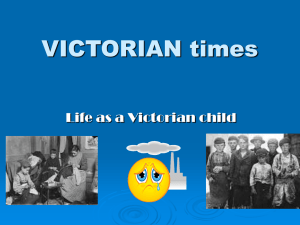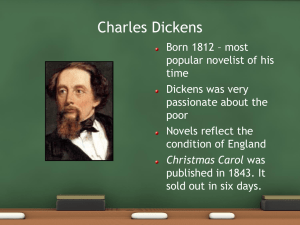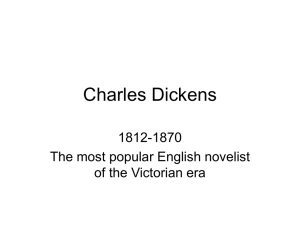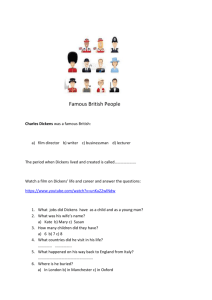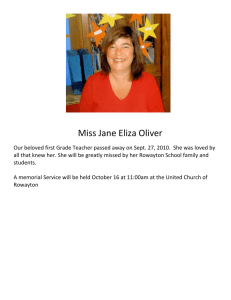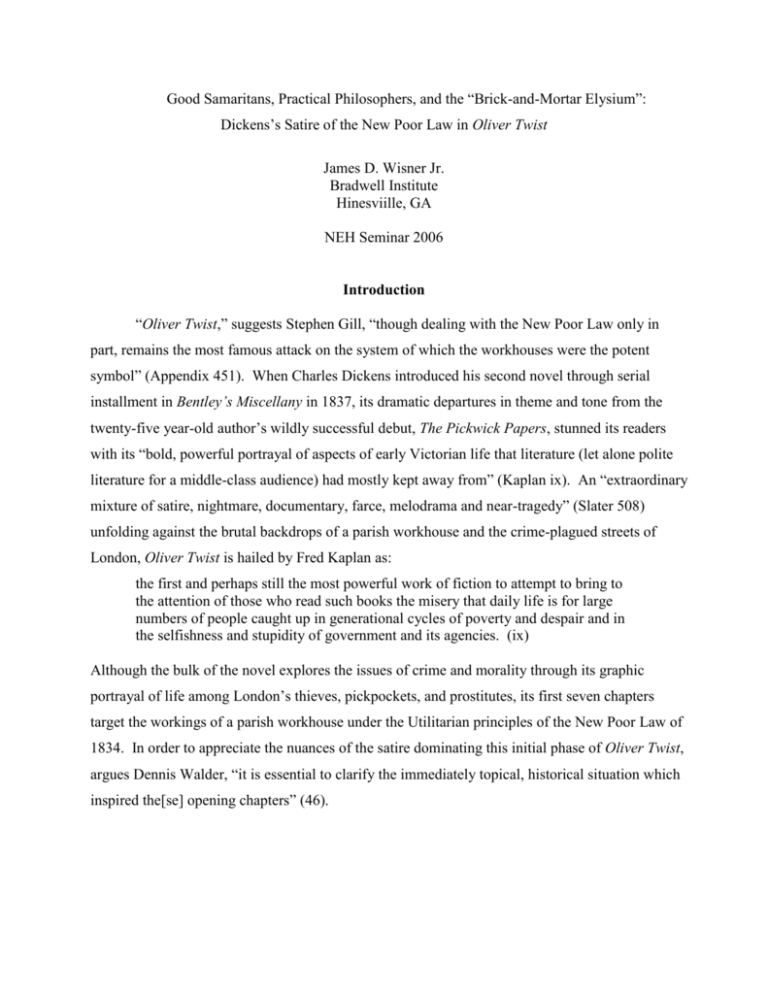
Good Samaritans, Practical Philosophers, and the “Brick-and-Mortar Elysium”:
Dickens’s Satire of the New Poor Law in Oliver Twist
James D. Wisner Jr.
Bradwell Institute
Hinesviille, GA
NEH Seminar 2006
Introduction
“Oliver Twist,” suggests Stephen Gill, “though dealing with the New Poor Law only in
part, remains the most famous attack on the system of which the workhouses were the potent
symbol” (Appendix 451). When Charles Dickens introduced his second novel through serial
installment in Bentley’s Miscellany in 1837, its dramatic departures in theme and tone from the
twenty-five year-old author’s wildly successful debut, The Pickwick Papers, stunned its readers
with its “bold, powerful portrayal of aspects of early Victorian life that literature (let alone polite
literature for a middle-class audience) had mostly kept away from” (Kaplan ix). An “extraordinary
mixture of satire, nightmare, documentary, farce, melodrama and near-tragedy” (Slater 508)
unfolding against the brutal backdrops of a parish workhouse and the crime-plagued streets of
London, Oliver Twist is hailed by Fred Kaplan as:
the first and perhaps still the most powerful work of fiction to attempt to bring to
the attention of those who read such books the misery that daily life is for large
numbers of people caught up in generational cycles of poverty and despair and in
the selfishness and stupidity of government and its agencies. (ix)
Although the bulk of the novel explores the issues of crime and morality through its graphic
portrayal of life among London’s thieves, pickpockets, and prostitutes, its first seven chapters
target the workings of a parish workhouse under the Utilitarian principles of the New Poor Law of
1834. In order to appreciate the nuances of the satire dominating this initial phase of Oliver Twist,
argues Dennis Walder, “it is essential to clarify the immediately topical, historical situation which
inspired the[se] opening chapters” (46).
2
Benthamite Utilitarianism and the New Poor Law of 1834
“The Poor Law Amendment Act of 1834,” asserts Kenneth Morgan, “was the most important
legislation associated with the operation of the poor law since its Elizabethan origins” (66). Amid
much controversy, this New Poor Law took its place alongside the Reform Bill of 1832 and the
Factory Act of 1833 within the vanguard of reform legislation which the newly-ascendant middleclass Liberals were then pushing through Parliament. Following closely the recommendations of
the Royal Poor Law Commission of 1832, it “applied the principles of political economy to the
problem of the poor as stringently as common feeling and opinion could, under the circumstances,
allow” (Engel 52). A systematic overhaul of the Old Poor Law system, the Poor Law Amendment
Act is far too broad a topic for thorough discussion here. Yet two prominent changes in the law
which particularly provoked the wrath of the young Dickens do merit closer consideration: the
harsh, heavy-handed influence of Benthamism and “political economy” on shifts in the
government’s attitude toward pauperism; and the deliberately deterrent function assigned to parish
workhouses in consequence of this new attitude.
The New Poor Law of 1834, asserts K.J. Fielding, was no mere “practical expedient”; it
reflected, rather, the systematic application of “Benthamite principles” to legislation and
governance “as a matter of public conduct” (53-54). Jeremy Bentham, 1748-1832, exerted a
profound influence on the parliamentary reforms of the 1830s and 1840s. The father of
Utilitarianism, he devoted his life to the promotion of social and political reforms based on his
“principle of utility”, or “greatest happiness principle”, which he explained through the
“fundamental axiom” that the greatest good for the greatest number should always be the ultimate
goal of any action (Hall 261). Possessing a rational, mechanistic world-view shaped by the
eighteenth-century principles of the Enlightenment, Bentham promoted the use of a “felicific” or
“moral calculus”; all decisions, he suggested, whether collective or individual, should follow from
the “scientific” analysis of “facts” and the “calculation of future probabilities” arising from any
particular course of action (Hall 271). “Fearlessly investigating traditional practices in law and
government, and, on the basis of statistical evidence, pushing through drastic changes,” he and his
well-intentioned disciples enthusiastically promoted one reform project after another (Ford and
Monod 315). While stressing increased governmental centralization, bureaucratic efficiency, and
public accountability, however, his school of thought paradoxically remained closely associated
3
with the individualistic free-market theories of Adam Smith and the “dismal science” of
economists Thomas Malthus and David Ricardo. Utilitarianism, as Graham Law explains:
was . . . firmly linked to those bourgeois and manufacturing interests known
later as the Manchester School; it tended to see legal and social reform in the
removal of obstructions to the operation of the market, in other words, it
believed in laissez-faire; its mode of thought tended toward mechanism, as we
can see from the details of Bentham’s own methods of calculating happiness, or,
more influentially, in the iron-clad laws of the new school of political economy
led by David Ricardo; and its harsh moral tone was sometimes reminiscent of
the puritanical intolerance of contemporary evangelicalism.” (15)
Deserved or not, by 1837 the critics of Utilitarianism had branded it with a reputation for cold,
calculating rationality and for harsh, inhumane insensitivity to the plight of individuals.
Bentham, Malthus, and Ricardo had all weighed in on the issue of poor law reform long
before 1834. Although Bentham argued for the continuation of poor relief “so that the happiness
principle was not eroded by people being subject to starvation or the fear of starvation”, he
nevertheless wanted the system to operate “much differently than it currently did” (Morgan 65).
Increased accountability and efficiency, he suggested, would relieve the growing financial burden
it was placing on parish rate-payers. The political economists, meanwhile, argued that open-air
relief not only undermined the operation of the free-market system, but actually “added to the
problem of poverty” by encouraging earlier marriages and larger families. The existing system of
poor relief, moreover, threatened its able-bodied recipients with “moral degradation” by “inuring
them” to handouts and thereby destroying their natural tendencies toward “self-reliance” (Morgan
64).
The 1834 Report of the Poor Law Commission, which suggested the path the Poor Law
Amendment Act subsequently would follow, clearly bore the imprint of these influential theorists.
Dominated by Edwin Chadwick, Bentham’s one-time secretary, and the political economist
Nassau Senior, the Commission submitted findings to Parliament which:
stressed the economic costs and moral failure that they found in the provision of
poor relief. . . . Underpinning the report were views, congenial to political
economists, that the current operation of the poor laws created poverty by its
generosity and by reducing incentives to seek paid employment. . . . It argued for
the Old Poor Law [actually] creating the conditions of poverty. (Morgan 65)
Formulated within its Benthamite climate, pursues Monroe Engel, the Report therefore argued
(without formally recommending it) that “pauperism must be made less desirable than the
4
condition of people dependent for their subsistence on the most menial kind of work, or else it
[would] soon be impossible to get people to do this menial work” (53). This harsh attitude, that
the Poor Law should “deter all but the otherwise helpless from seeking poor relief,” would
characterize the spirit governing the operation of the New Poor Law (Gill, Appendix 452).
With its vast bureaucracy of Poor Law Commissioners and its new system of parliamentary
oversight, observes Gill, “the New Poor Law introduced a wholly new structure to poor relief”
through which, in theory at least, “local variety of provision was to give way to centralized
uniformity”; regional disparities in costs, and thus of poor rates, were expected to become “a thing
of the past”. Yet the New Poor Law, he continues, was also new in a much different sense; its
provisions introduced “a tougher attitude toward poor relief, altogether” (Appendix 452). The
embodiment of this new attitude was the workhouse, a deliberately grim, intimidating environment
in which those receiving relief would be required to live as inmates. Out-of-door relief,
theoretically, would cease to exist. “The workhouse system,” explains Morgan:
was intended to symbolize the New Poor Law . . .. These new workhouses were
intended to act as a deterrent to the able-bodied poor. Accordingly, they were
designed and run as forbidding institutions. Many were large stone structures
with the outward appearance of a prison; not surprisingly, their opponents referred
to them as “bastilles”. . . . They were divided into separate wards for adult men,
adult women, children, the sick and the mentally incapacitated [with family
members being formally separated from one another]. Inmates wore uniforms.
The daily regimen was a relentless routine of work — hence the name
“workhouse” — and strict meal times and curfews. . . . The food provided was
monotonous and stodgy. Inmates were subject to the discipline overseen by the
master of the workhouse. . . . The regimen tended to be spartan and strict. (68)
Such practices as these aggressively discouraged the poor from seeking relief. “Conditions at the
workhouse,” corroborates Gill, “were to be such that no one would choose to enter unless they had
no alternative. In other words, the standard of life was deliberately made poorer than that enjoyed
(or endured) by the lowest-paid independent labourer” (Appendix 452).
Advocate of the Poor: Dickens’s Hostility to the New Poor Law
From its earliest installments in 1837, Dickens employed Oliver Twist as a vicious assault
on the New Poor Law system; Gill favorably compares its darkly satiric invective to the work of
Jonathan Swift and William Hogarth (Introduction ix-x). Subtitled The Parish Boy’s Progress, the
new novel directed the main thrust of its criticism not at any one aspect of the new system of relief,
5
but more broadly at “the spirit” pervading its general application at the parish level (Gill,
Introduction xi). “In a story begun in 1837,” Gill notes, such a spirit “could only be interpreted as
the spirit of the New Poor Law of 1834” (Appendix 453). Coming from his background as a
parliamentary reporter, Dickens not only was well-acquainted with the political and press debates
that had swirled around the implementation of the Poor Law Amendment, but also had formed
very strong opinions of his own regarding the topic (Fielding 61-62). He would eventually write:
That my view of the Poor Law may not be mistaken or misrepresented, I will state
it. I believe there has been in England, since the days of the STUARTS, no law
so often infamously administered, no law so openly violated, no law habitually so
ill-supervised. In the majority of the shameful cases of disease and death from
destitution, that shock the Public and disgrace the country, the illegality is quite
equal to the inhumanity – and known language could say no more of their
lawlessness. (Postscript 856-857)
The fundamental reason for Dickens’s antipathy toward the New Poor Law, in all of its alleged
“corruptions” and “inhumanity”, should be abundantly clear to anyone familiar with the author’s
life and works. His indictment of poor law legislation, and of the mechanistic Utilitarian principles
driving its administration, reflected his life-long advocacy of working-class Englishmen’s rights,
an advocacy stemming from his recollections of his own childhood. “Dickens,” explains Engel,
“learned about poverty in the least desirable way, by being a poor child” (49). Throughout his life,
the author remained haunted by his traumatic experience, at the age of twelve, of being thrust out
into the world, and into a boot-blacking warehouse, while his father was imprisoned for debt:
It is wonderful to me how I could have been so easily cast away at such an age . . .
that . . . no one had compassion enough on me. . . . The deep remembrance of the
sense I had of being utterly neglected and helpless; of the shame I felt in my
position; of the misery it was to my young heart to believe that, day by day, what
I had learned, and thought, and delighted in, and raised my fancy and my
emulation up by, was passing away from me, never to be brought back any more;
cannot be written. My whole nature was so penetrated with the grief and
humiliation of such considerations, that even now, famous and caressed and
happy, I often forget in my dreams that I have a dear wife and children; even that
I am a man; and wander desolately back to that time of my life. (qtd. by Gill,
Introduction xviii-xix)
Scarred by the memories of his own ordeal, which he had done nothing to deserve, Dickens
the novelist consistently exhibited great compassion for the plight of Industrial Britain’s lower
classes. As “the thorough-going advocate of the poor, the uncompromising Radical” (Gissing 68-
6
69), Dickens’s “interest in the poor,” according to Engel, “was constant and passionate. The
pity and pain of their condition was always apparent to him, and part of the great obsessive center
of his writing. In all his fiction, there was purpose in his portraits of the poor” (49). Dickens
himself confirmed this sense of purpose:
I have great faith in the Poor; to the best of my ability I always endeavor to
present them in a favourable light to the rich; and I shall never cease, I hope, until
I die, to advocate their being made as happy and as wise as the circumstances of
their condition in its utmost improvement, will admit of their becoming. (qtd. by
Engel 49-50)
This self-proclaimed champion of the masses was therefore critical not only of the New Poor Law
as such, “but of the whole structure of beliefs concerning the poor which underlay the legal system
of his time” (Walder 51). Toward the Benthamite legislation’s “seemingly harsh treatment of a
helpless class” he expressed great bitterness, regarding it “as the outcome of cold-blooded theory,
evolved by well-to-do persons of the privileged caste, who neither perceive[d] nor care[d] about
the result of their system in individual suffering” (Gissing 68).
The Parish Boy’s Progress: Poor Law Satire in Oliver Twist
The seven chapters opening Oliver Twist expose the evils of the New Poor Law of 1834
through a lurid satire of its operation within a parish workhouse. Oliver, an illegitimate orphan
born into the workhouse, serves as “the traditional symbolic satiric hero” of the novel, an
“innocent to whom the things that happen reveal the appalling nature of the world through which
he is passing” (Slater 509). Dickens uses this “Parish Boy’s Progress” to expose the New Poor
Law’s provisions “through the simple device of showing how they bear upon a child” (Gill,
Introduction xi). In the characters of Mr. Bumble, Mrs. Mann, the gentleman in the white
waistcoat, and the other “great experimental philosophers” (20) among the parish officials, he
introduces his readers to a collection of “jacks-in-office whose cruelty, shading from mere
heedlessness to sadism, is sanctioned, even dignified, by the ordinances of legislation driven by the
social vision of Benthamism” (Gill, Introduction ix). And the plot developments of the early
chapters explore a variety of specific features of the New Poor Law. Several of the practices
Dickens addresses, such as the “farming” of infants and the apprenticing of orphans, were not new
to the 1834 law; he recruits them, however, for their effectiveness in attacking a system in which
they remained significant features (Walder 52-53). Throughout his portrayals of such practices,
7
along with those governing the operation of the workhouse itself, he repeatedly levels the
following charges against the operation of the New Poor Law: inadequate and monotonous dietary
provisions; “uncaring, inadequate” health services; and unnecessary cruelty and petty tyranny
(Gill, Appendix 453-454).
Dickens’s attack on the severity of workhouse dietary restrictions produces not merely the
most memorable line in Oliver Twist --- “Please, sir, I want some more” (27) --- but arguably one
of the most iconic moments in the entire canon of British fiction. Yet by no means does the author
limit his criticism to one passage. From the outset, he symbolically characterizes the parish board
of directors as “eight or ten fat gentlemen” under the leadership of a “particularly fat” chairman
(24). Their corpulence starkly contrasts the emaciated figures of the workhouse inmates; young
Oliver himself, the reader learns, is “a pale thin child, somewhat diminutive in stature, and
decidedly small in circumference” (21). These over-fed gentlemen’s blueprint for the provision of
workhouse sustenance is painfully austere:
They contracted with the water-works to lay on an unlimited supply of water; and
with the corn-factor to supply periodically small quantities of oatmeal; and issued
three meals of thin gruel a day, with an onion twice a week, and half a roll on
Sundays. (26)
Dickens does not allow the impact of such strictures to remain implicit. “Boys,” he
reminds his readers, “have generally excellent appetites”; Oliver and his fellow inmates, therefore,
“suffer the tortures of slow starvation” until they become “voracious and wild with hunger” (26).
Only such horrible suffering, the narrator explains, could possibly kindle the “recklessness” and
“temerity” with which Oliver approaches the master of the serving line (“a fat, healthy man”),
bowl in hand, to make his famous entreaty (27). First this master, then the workhouse beadle, then
the board react with “stupefied astonishment” to the “small rebel’s” audacity:
The board were sitting in a solemn conclave, when Mr. Bumble rushed into the
room in great excitement, and addressing the gentleman in the high chair, said,
“Mr. Limbkins, I beg your pardon, sir! Oliver Twist has asked for more!” There
was a general start. Horror was depicted on every countenance. “For more!” said
Mr. Limbkins. “Compose yourself, Bumble, and answer me distinctly. Do I
understand that he asked for more, after he had eaten the supper allotted by the
dietary?” . . . “That boy will be hung,” said the gentleman in the white waistcoat.
“I know that boy will be hung.” (27)
8
The board is so outraged by Oliver’s “impious and profane offense” (29) that they immediately
advertise a bonus of five pounds, payable to anyone who will take him on as apprentice and
thereby remove him from their care.
Dickens’s satire of dietary regulations does not end with the serving line scene. When Mr.
Gamfield, the disreputable chimney-sweep, arrives to claim Oliver’s services as an apprentice, his
thorough knowledge of the “dietary of the workhouse” assures him, sight unseen, that the orphan
will be “a nice small pattern: just the very thing for registry stoves” (31). And one of the novel’s
most powerfully affecting images is of Oliver, immediately following his removal from the
workhouse, greedily falling upon the scraps of a meal left untouched by a dog:
I wish some well-fed philosopher, whose meat and drink turn to gall within him,
whose blood is ice, whose heart is iron; could have seen Oliver Twist clutching at
the dainty viands that the dog had neglected. I wish he could have witnessed the
horrible avidity with which Oliver tore the bits asunder with all the ferocity of
famine. There is only one thing I should like better; and that would be to see the
Philosopher making the same sort of meal himself, with the same relish. (41)
Finally, Dickens closes the workhouse section of the novel with Oliver’s furious assault on Noah
Claypole (who has provoked his rage by taunting him excessively about his dead mother) and his
subsequent decision to run away from Mr. Sowerberry, the undertaker to whom he is apprenticed.
When “that great satiric creation”, Mr. Bumble, the larger-than-life beadle who supervises
parochial discipline and functions within the novel as the ultimate embodiment of “the world of the
workhouse” (Slater 509), arrives at the scene of Oliver’s crime, he offers a “practical
philosophical” explanation for the young boy’s violent outburst:
“It’s not Madness, ma’am,” replied Bumble, after a few moments of deep
meditation. “It’s Meat.” . . . “Meat, ma’am, meat” replied Bumble, with stern
emphasis. “You’ve overfed him, ma’am. You’ve raised an artificial soul and
spirit in him, ma’am, unbecoming a person of his condition. . . . What have
paupers to do with soul or spirit? It’s quite enough that we let `em have live
bodies. If you had kept the boy on gruel, ma’am, this never would have
happened.” (56)
A second broad accusation which Oliver Twist levels against the operation of the New Poor
Law is the charge of gross negligence towards the needs of its dependents, be they material,
medical, emotional, or spiritual. The very first scene of the novel, Oliver’s birth, underscores the
inadequate healthcare service provided by the workhouse:
9
Now, if during this brief period, Oliver had been surrounded by careful grandmothers,
anxious aunts, experienced nurses, and doctors of profound wisdom, he would
most inevitably and indubitably have been killed in no time. There being nobody
by, however, but a pauper old woman, who was rendered rather misty by an
unwonted allowance of beer; and a parish surgeon who did such matters by
contract; Oliver and Nature fought out the point between them. (18)
While he manages to survive this initial struggle, his mother is not so fortunate. Her medial
attendants speak mechanically of “hope and comfort”; but these qualities, the narrator somberly
informs the reader, have been “strangers too long” to the workhouse (18). Once their half-hearted
efforts to save her fail, the doctor matter-of-factly departs for dinner (leaving instructions that he
does not wish to be bothered on account of the child, although it “very likely . . . will be
troublesome”) and his assistant returns her attention to her “green bottle” even as she tends to the
infant (19).
Dickens pursues this charge of negligence through his description of Mrs. Mann’s orphan
“farm”. After being “brought up by hand” — fed a mixture of water and bread — in the
workhouse of his birth for some months (19), the “hungry and destitute” child is farmed out to a
branch-workhouse nearby “where twenty or thirty other juvenile offenders against the poor-laws,
rolled about the floor all day, without the inconvenience of too much food or too much clothing,
under the parental superintendence of an elderly woman” (20). Under the protection of this “great
experimental philosopher”, who generally ignores her charges, locks them in a coal cellar when
they annoy her, and rarely bothers even to wash them unless the board is due to visit (21), a child’s
chances of surviving are grievously poor:
It did perversely happen in eight and a half cases out of ten, either that it sickened
from want and cold, or fell into the fire from neglect, or got half-smothered by
accident; in any one of which cases, the miserable little being was usually
summoned into another world, and there gathered to the fathers which it had
never known in this. (20)
This inattention to the children’s material needs and safety, moreover, is matched by the
indifference of the workhouse to their emotional and spiritual needs. It is fundamentally their lot
in life, as parish children, to be “despised by all, and pitied by none” (19). When Mr. Bumble
collects Oliver away from Mrs. Mann’s “wretched home” on his ninth birthday so that he may
begin picking oakum in the workhouse proper, the narrator closes this chapter of his life with the
declaration that “one kind word or look had never lighted the gloom of his infant years” (24). The
10
reader, moreover, soon learns that the parish has allowed Oliver to reach the age of nine
without ever learning to behave “like a Christian” — or even to say his prayers at night —
“because nobody [has] taught him” (25). Of all the indictments of negligence against a relief
system officially administered through the church, this may be the most disgraceful. In light of
such neglect, it seems only natural that Oliver should mature into a quiet, melancholy child who
believes that he is thoroughly unloved, universally despised, and totally alone in the world (40).
A third major indictment against the New Poor Law which Dickens unflinchingly presents
is that of the cruelty and brutality which characterize its operation within the workhouse. When
parochial officials or other authority figures do pay any attention to parish children, it is only to
bully them or beat them into submission. From the narrator’s reference in Chapter Two to Mrs.
Mann’s fist, which “had too often been impressed upon [Oliver’s] body not to be deeply impressed
upon his recollection” (23), to his description of the “drubbing” which Mr. Sowerberry administers
to Oliver at the end of Chapter Seven (57), the reality of physical abuse remains ever-present. The
enraged master of the serving line even uses his ladle to strike a blow at Oliver’s head when the
miscreant dares to ask for more food (27).
The two officials with whom this systematic brutality is most closely associated, however,
are Mr. Bumble, the aforementioned beadle, and a sadistic board-member known only as “the
gentleman in the white waistcoat.” “The abuse of power,” states Gill, is “not confined to Poor
Law officers,” but it is with Mr. Bumble that Dickens most strongly “identifies the way in which
any institutional exercise of authority encourages the brutal” (Appendix 454). A fat, “choleric”
man with an inflated belief in his own importance (21-22), Bumble terrorizes the inmates of the
workhouse with a large, “well-known cane” (40) that is as much a part of his persona as his oversized coat or his bombastic oratory. In seemingly every other scene he threatens, intimidates, or
prods young Oliver with the great stick. And for a full week following the serving line episode, he
makes “repeated application of the cane” to the youngster’s naked body every morning before
“sociably” flogging him in the dining hall (as a “public warning and example” to the other boys)
later in the day (30).
As for the gentleman in the white waistcoat, he seems to exist within the novel only to
predict – with great regularity – Oliver’s ultimate destiny with the gallows and to promote – with
malicious pleasure – the efficacy of strict physical punishment. Upon observing Mr. Gamfield’s
violent “correction” of a donkey, he “smile[s] joyously” when the chimney-sweep comes up to
11
read the bill advertising Oliver for apprenticeship: “he saw at once that Mr. Gamfield was
exactly the sort of master Oliver Twist wanted” (30). Being “very much amused” by Gamfield’s
account of his harsh treatment of apprentices (31), the gentleman exhorts him that Oliver “wants
the stick, now and then: it’ll do him good” (32). And upon hearing of Oliver’s attack on Noah, he
disgustedly observes that: “They’ll never do anything with him, without stripes and bruises” (56).
Such, Dickens suggests, is the malignant mentality governing the administration of the Poor Law.
The most fundamentally monstrous accusation that Oliver Twist levels against the New
Poor Law, however, is the underlying spirit of callousness and hypocrisy which Dickens claims is
characteristic of parochial attitudes toward the poor. More execrable than Mrs. Mann’s
combination of negligence and brutality toward her young wards, for example, is her greed in
pocketing herself the “greater part” of the funds allocated for their upkeep. “The elderly female
was a woman of wisdom and experience,” the narrator asserts. “She knew what was good for
children; and she had a very accurate perception of what was good for herself” (20). The
willingness with which the parish board agrees to apprentice Oliver to the notoriously cruel
Gamfield, (effectively passing a death sentence upon the boy), is equally appalling:
As Mr. Gamfield did happen to labor under the slight imputation of having
bruised three or four boys to death already, it occurred to him that the board had,
perhaps, in some unaccountable freak, taken it into their heads that this extraneous
circumstance ought to influence their proceedings. It was very unlike their
general mode of doing business, if they had. (31-32)
In fact, however, the board members have no qualms about leaving Oliver to the chimney sweep’s
tender mercies; they merely hope to drive a harder bargain with him. Once Gamfield agrees to
accept a reduced compensation, they are happy to hand over the hapless orphan. “Take him, you
silly fellow!” concludes the gentleman in the white waistcoat. “He’s just the boy for you. . . . [A]nd
his board needn’t come very expensive, for he hasn’t been overfed since he was born. Ha! ha! ha!”
(32).
The jocularity with which this parochial administrator acknowledges the deliberate
inadequacy of the workhouse diet recurs in a later exchange between Mr. Bumble and the
undertaker:
“The prices allowed by the board are very small, Mr. Bumble.”
“So are the coffins,” replied the beadle: with precisely as near an
approach to a laugh as a great official ought to indulge in.
12
Mr. Sowerberry was much tickled by this: as of course he ought to be;
and laughed a long time without cessation. “Well, well, Mr. Bumble,” he said at
length, “there’s no denying that, since the new system of feeding has come in, the
coffins are something narrower and more shallow than they used to be; but we
must have some profit.” (37)
The callous disregard for human suffering exhibited in this “witty” banter sets the tone for a
brutally satiric passage in which Dickens reveals the depths of parochial hypocrisy by referencing
the ultimate parable of Christian charity:
“Dear me, what a very elegant button that is, Mr. Bumble! I never noticed it
before.”
“Yes, I think it is rather pretty,” said the beadle, glancing proudly
downward at the large brass buttons which embellished his coat. “The die is the
same as the parochial seal – the Good Samaritan healing the sick and bruised
man. The board presented it to me on New-year’s morning, Mr. Sowerberry. I
put it on, I remember, for the first time, to attend the inquest on that reduced
tradesman, who died in a doorway at midnight.”
“I recollect,” said the undertaker. “The jury brought in, ‘Died
from exposure to the cold, and want of the common necessities of life,’ didn’t
they?” (37-38)
Dickens presents his most graphic scenes of administrative disregard for suffering in the
passages relating to the death and burial of the Bayton woman, yet another victim of parochial
neglect. Contracted by Bumble to provide a coffin and funeral for the indigent woman, Sowerberry
and Oliver wind their way through a hellishly “squalid” area of the city to “a narrow street more
dirty and miserable than any they had yet passed through” (47). Along its wretched tenement
fronts, “the very rats, which here and there lay putrefying in its rottenness, were hideous with
famine” (47). In response to the dismal scene which greets them upon entering the lodging of the
deceased, the undertaker (“who was pretty well used to misery in all is shapes”) ignores the
horribly agonized ranting of the grief-stricken husband and the bitter weeping of the ragged
children, shakes off the persistent entreaties of the demented old mother, rapidly measures the
body, and quickly hurries away (48).
More flagrantly shocking is the insensitivity to human feelings and to the solemnity of the
occasion which all of the parochial officials, the clergyman in particular, exhibit at the woman’s
funeral. While Bumble and Sowerberry retire indoors to the comforts of the clerk’s fire and
newspaper, the two family members who have accompanied the coffin to its final resting place are
left to wait “patiently in the damp clay, with a cold rain drizzling down,” for “a lapse of something
13
more than an hour” until the clergyman belatedly arrives (49). Once he finally does appear,
“putting on his surplice as he [comes] along”, this “reverend gentleman” reads only “as much of
the burial service as [can] be compressed into four minutes”, removes his vestments, and
immediately departs without so much as a word to the mourners (49). When the dazed husband
subsequently falls into a swoon, the beadle and undertaker solicitously “[throw] a can of water on
him” and hastily usher him from the cemetery so that they may lock up and leave. “Ah, you’ll get
used to it in time,” Sowerberry assures Oliver during their walk home. “Nothing when you are
used to it, my boy” (50).
More than parsimony, more even than brutality, it is this inurement to human suffering, this
absolute indifference to the plight of the poor, which most galls Dickens. And throughout the
workhouse section of Oliver Twist he consistently attributes this lack of compassion to the
influence of Benthamite political economy. He repeatedly characterizes his parochial villains, not
merely as selfish opportunists, but as “philosophers”: the parish board who govern the workhouse
are introduced to the reader as “very sage, deep, philosophical men” (25); Mrs. Mann’s
management of parish children proves her to be “a very great experimental philosopher”(20); and
Mr. Bumble expresses nothing but contempt for “ineddicated, vulgar, grovelling wretches” who
don’t have any “philosophy nor political economy about ‘em” (38). By “philosopher”, argues
Gissing, Dickens means a “political economist”, a disciple of Malthus and Ricardo; whenever he
uses the term, it is “always in the spirit which moved Carlyle when speaking of ‘the dismal
science.’” (68) In voicing contempt for the “well-fed philosopher . . . whose blood is ice, whose
heart is iron” (Oliver Twist 41), therefore, “Dickens is directing his ethical criticism at the bleakly
inhuman . . . doctrines of political economy” (Horne xxii).
Dickens’s parish board epitomizes the impact of such a philosophy on the operation of the
New Poor Law. Cold and calculating in their practicality, its members dicker endlessly over
financial reports and other economic statistics while ignoring the human element of their
equations. “By and large,” observes Slater, “those in power do not see the people they govern;
they see only large abstractions such as ‘the surplus population’ or ‘paupers’” (510). Their
deliberations over Oliver’s apprenticeship clearly illustrate such a mentality:
The board then proceeded to converse upon themselves for a few minutes,
but in so low a tone, that the words “saving of expenditure,” “look well in the
accounts,” “have a printed report published,” were alone audible. These only
14
chanced to be heard, indeed, on account of their being very frequently repeated with
great emphasis. (31)
Within such a philosophy, all that matters is the “bottom line”; consequently, they turn young
Oliver over to an employer “whose villainous countenance was a regular stamped receipt for
cruelty”(34) in order to save the parish a mere one pound, ten shillings (32).
In what ultimately is the most important passage of the novel’s workhouse chapters, these
“sage, deep, philosophical men” unleash their political economy on the problem of pauperism;
their solution for reducing parish expenditures would have been all too familiar to critics of the
New Poor Law in 1837:
When they came to turn their attention to the workhouse, they found out at once,
what ordinary folks would never have discovered – the poor people liked it! It
was a regular place of public entertainment for the poorer classes; a tavern where
there was nothing to pay; a public breakfast, dinner, tea, and supper all the year
round; a brick-and-mortar elysium, where it was all play and no work. “Oho!”
said the board, looking very knowing; “we are the fellows to set this to rights;
we’ll stop it all, in no time.” So they established the rule, that all poor people
should have the alternative (for they would compel nobody, not they,) of being
starved by a gradual process in the house, or by a quick one out of it. (25-26)
To dissuade potential poor relief applicants, the board subsequently establishes “a great many . . .
wise and humane regulations”, all of which parallel the actual provisions of the Poor Law
Amendment Act of 1834. The most fundamental change, as with the 1834 Poor Law, is that “relief
was [now] inseparable from the workhouse and the gruel; and that frightened people” (26). Such a
fearsome deterrent as the new workhouse policy pays immediate dividends; within just a few
months, the narrator reports, “the number of workhouse inmates got thin as well as the paupers;
and the board were in ecstasies” (26). Although Dickens never directly names Bentham at any
point in Oliver Twist, such transparent references to the philosophical arguments and
recommendations of the 1832 Poor Law Commission (drafted largely by Chadwick) leave little
doubt that his “philosophers” satirize not only the principles of political economy but also
Utilitarian attitudes toward reform as well.
Beyond the Workhouse: “Charity” in Oliver Twist
Dickens’s satire of Benthamism and political economy does not end with Oliver’s
decision to run away to London at the end of Chapter Seven. For the remainder of the novel,
15
however, his focus shifts away from the parish workhouse and the workings of the New Poor Law
and toward the world of the London “underground”, the world inhabited by Fagin and his gang,
the world dominated by the Benthamite principle of “Number One” (288-289). A final point for
consideration, therefore, is the relationship of the workhouse section of Oliver Twist to the novel as
a whole. “Oliver Twist,” argues Gissing, “had a twofold moral purpose: to exhibit the evil
working of the Poor Law Act, and to give a faithful picture of the life of thieves in London. The
motives hung well together, for in Dickens’s view the pauper system was directly responsible for a
great deal of crime” (67). By driving paupers away from public relief, Dickens feared, the
merciless operation of the New Poor Law would condemn them to more desperate levels of
poverty and subsequently would force more of them into lives of crime. As Slater explains:
What continuity is there between the satirically-presented social institutions of the
first seven chapters and the London of Fagin? . . . The society we are shown in the
first seven chapters is one in which selfishness dominates everything B each
group and individual is out for his own interests but there is a hypocritical
pretense at a true society with institutions of government, law, and religion.
Fagin=s anti-society, eating out of the heart of the city, occupying ruined old
houses deserted by “respectable” society, is by comparison “honest” in that
“looking after Number One” is the openly avowed principle on which it rests.
(513)
A fundamental theme running throughout Oliver Twist, and much of Dickens’s
subsequent work, is the author’s plea for greater humanity, compassion, and charity – from public
as well as private institutions – in addressing the needs of society’s less-fortunate members. His
fundamental objective in writing this novel, Walder suggests, “is to move us . . . into sympathy and
charity for the poor” (41), and he calls upon government agencies as well as individual
philanthropists to embrace the parable of the Good Samaritan and apply its message to their
conduct. “What Dickens and other observers found most reprehensible in the operation of the
New Poor Law,” asserts Engel, “was [its] combination of inefficiency and a basic lack of charity”
(55). “Where he breaks on principle with the writers of the Report of 1834, Engel continues, “is in
his belief that charity cannot be merely private but must enter also into any government plan for
dealing with paupers” (56). Dickens’s broader goal, moreover, extends well beyond reform of the
Poor Law itself; “his demand,” argues Gissing, is “for justice and mercy, in the largest sense, for a
new spirit in social life” (70).
16
Throughout the novel, therefore, Dickens repeatedly upbraids the failures of public
institutions to meet society’s needs. “At no point in the novel,” for example, “is the orphaned
Oliver shown as being able to appeal for sympathy or vindication to public institutions, charitable
or legal” (Horne xiv-xv). As Slater explains: “Dickens shows with devastating economy the
failure, or worse than failure, of the institutions of society – Government, the Law, the Church.
Existing to protect the weak against the strong they do nothing of the sort or, if they do, it is quite
accidentally” (509-510).
Courts of law provide the novel’s prime examples of official failings beyond the world
of parochial officials and the workhouse. Oliver’s first introduction to the Law comes in the
persons of two aged, “half blind and half childish” (34) magistrates, one of whom is actually
dozing at his post when the boy appears before them. Only the inability of this elderly official to
find his inkwell, right under his nose, delays him from immediately signing off on the youngster’s
apprenticeship to Gamfield:
[A]nd happening in the course of his search to look straight before him, his gaze
encountered the pale and terrified face of Oliver Twist: who, despite all the
admonitory looks and pinches of Bumble, was regarding the repulsive
countenance of his future master: with a mingled expression of horror and fear,
too palpable to be mistaken, even by a half-blind magistrate. . . . “My boy!” said
the old gentleman, “you look pale and alarmed. What is the matter?” (34-35)
Thus it is only by accident – or an act of providence, perhaps – that the literal blindness of the Law
saves Oliver from the chimney sweep’s tyranny.
Later in the novel, another magistrate, Mr. Fang, serves not merely to illustrate the
blind incompetence of the legal system but also to highlight its lack of compassion and its outright
cruelty. Fang summarily sentences young Oliver to three months of hard labor for a crime (the
theft of Mr. Brownlow’s handkerchief) which he has not committed, for which there is no
evidence, and for which there are no witnesses (79). As the narrator explains:
The presiding Genii in such an office as this exercise a summary and arbitrary
power over the liberties, the good name, the character, almost the lives of Her
Majesty’s subjects, especially of the poorer class; . . . within such walls, enough
fantastic tricks are daily played to make the angels blind with weeping. (80)
Far from protecting the weak, Dickens thus strongly suggests, the British court system actually
heaps fresh abuses upon the victims of social injustice.
17
Ultimately it will not be the Law, or any other state institution, which saves Oliver from
the machinations of Fagin and Monks, but an assemblage of private citizens: Mr. Brownlow, Dr.
Losberne, and the Maylies. They recognize the boy’s innate goodness and therefore go to great
lengths – and expense – to protect him and to secure his happiness. As Horne explains:
Another aspect of what has been called the book’s “Manichean” vision is that its
“good” bourgeois world is emphatically unofficial, operates quite apart from, and
more efficiently than, the institutions of the state and their hierarchies. . . . The
“good” characters form a private “committee” in the end, acting without reference
to the law . . . They do this because they believe Oliver’s story of his innocence,
despite his inability to produce any evidence of it (which means he cannot have
recourse to the official world that requires provable facts). (xli)
In contrast to the calculated self-interests not only of such “philosophers” as Fagin, his
gang of pick-pockets, and Noah Claypole, but also of Bumble, Mrs. Mann, Sowerberry, the parish
board, and other “public servants”, Dickens thus provides the reader with an array of benevolent
characters who feel strong obligations to do right by others. “Oliver Twist”, insists Fielding, “is
directly concerned with duty and sacrifice, repeatedly returning to sacrifice as a moving reality
forced into our notice” (57). Harry, Rose, and most obviously the prostitute Nancy, he continues,
all consciously choose to sacrifice what is in their own personal interests in their efforts to save
others (58). Through the actions of such individuals, Dickens offers repeated object lessons in the
power of human decency and charity. Only when the spirit and administration of public law begin
to reflect such compassion, he leaves the reader to conclude, will proper reform of Victorian
society become a reality.
Conclusion
“Though we can read [Dickens’s] novels almost independently of their time, genesis,
allusions, direction, social content, and reception,” observes Fielding, “all these are interrelated
and may affect our understanding” (62). With its gritty, uncompromising portrayals of urban
poverty and crime, and with its satiric attacks on the public institutions which exacerbated these
problems (at least in the author’s opinion), such is certainly the case with Oliver Twist. Not until
significantly later, with Hard Times (1854), would Dickens devote an entire novel to his assault on
the fundamental principles of Benthamism (or Gradgrindism). From the very outset of his literary
career, however, his antipathy toward Utilitarian public policy was already influencing his fiction.
His attitudes toward Benthamism and political economy, as well as his cynical views on the New
Poor Law of 1834, permeate Oliver Twist. “He was quite clear about the abuses, specific and
18
general, that he wished to attack,” insists Walder, “as well as about the way to attack them.” (53).
Dickens wrote, therefore, not merely to entertain his audience, but to inform them --- to outrage
them --- about the injustices of his day. “His general moods of kindliness and indignation,” states
Humphrey House, “meeting, as they did, a need of the time, deeply influenced the emotional
attitude of thousands of people to social problems” (222). And nowhere would he express his
indignation more strongly, or more influentially, than in the workhouse chapters of Oliver Twist.
Works Cited
Dickens, Charles. Oliver Twist: Authoritative Text, Backgrounds and Sources, Early Reviews,
Criticism. Ed. Fred Kaplan. New York: W.W. Norton, 1993.
Postscript. Our Mutual Friend. By Charles Dickens. New York: University Society, 1911. 856857.
Engel, Monroe. The Maturity of Dickens. Cambridge, MA: Harvard University Press, 1967.
Fielding, K.J. “Benthamite Utilitarianism and Oliver Twist: A Novel of Ideas” Dickens Quarterly
4 (1987), 49-65.
Ford, George, and Sylvere Monod. “Utilitarianism and the Science of Political Economy.” Hard
Times: Authoritative Text, Backgrounds, Sources, Contemporary Reactions, Criticism.
By Charles Dickens. Ed. George Ford and Sylvere Monod. 2nd Edition. New York:
W.W. Norton, 1990. 315-316.
Gill, Stephen. Appendix 3: Oliver Twist and the New Poor Law. Oliver Twist. By Charles
Dickens. Ed. Kathleen Tillotson. Oxford, UK: Oxford University Press, 1999. 451454.
Introduction. Oliver Twist. By Charles Dickens. Ed. Kathleen Tillotson. Oxford, UK: Oxford
University Press, 1999. vii-xxv.
Gissing, George. The Immortal Dickens. London: C. Palmer, 1925.
Harrison, Ross. “Jeremy Bentham.” The Blackwell Guide to the Modern Philosophers: From
Descartes to Nietzsche. Ed. Steven M. Emmanuel. Malden, MA: Blackwell, 2001.
259-277.
Horne, Philip. Introduction. Oliver Twist, or, The Parish Boy’s Progress. By Charles Dickens. Ed.
Philip Horne. London: Penguin, 2003. xiii-xliv.
House, Humphrey. The Dickens World. London: Oxford University Press, 1941.
Kaplan, Fred. Preface. Oliver Twist: Authoritative Text, Backgrounds and Sources, Early Reviews,
Criticism. By Charles Dickens. Ed. Fred Kaplan. New York: W.W. Norton, 1993.
Law, Graham. Introduction. Hard Times: For These Times. By Charles Dickens. Ed. Graham
Law. Peterborough, Ontario: Broadview, 2003.
Morgan, Kenneth. The Birth of Industrial Britain: Social Change, 1750-1850. Seminar Studies in
History. Harlow, UK: Pearson Longman, 2004.
Slater, Michael. “On Reading Oliver Twist.” The Dickensian 70 (1974): 71-81. Rpt. in Oliver
Twist: Authoritative Text, Backgrounds and Sources, Early Reviews, Criticism. By
Charles Dickens. Ed. Fred Kaplan. New York: W.W. Norton, 1993. 508-514.
Walder, Dennis. Dickens and Religion. London: George Allen and Unwin, 1981

